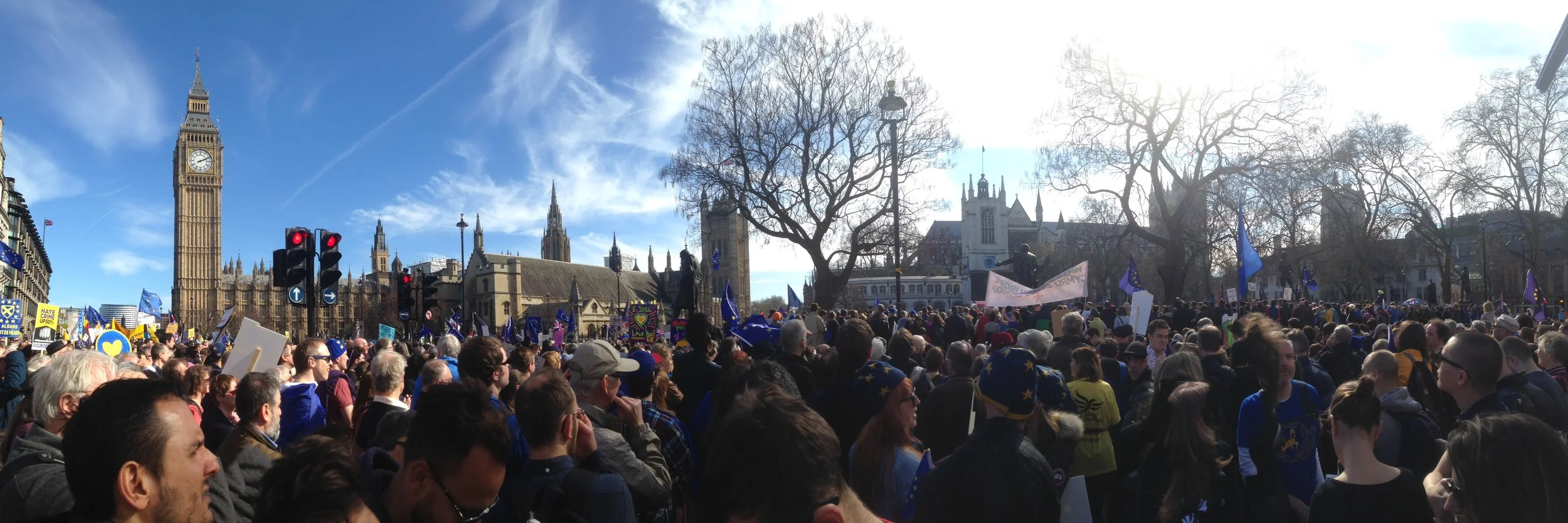What does protesting against Brexit achieve?
I am writing this on the day that Britain triggers Article 50 and we formally begin the process of leaving the EU. The papers are full of optimistic headlines - that they may live to deny they ever wrote in the first place - and Theresa May has said: “it is time to come together”.
If you go to Twitter this morning, you will see that lots of people are not in the mood to come together. They did not vote for Brexit, and there is still little evidence that it will go well. On Saturday some of these people, including me, were at a protest in central London. I was genuinely surprised by how passionate people were in defending the EU. I had expected the tone to be demoralised, but marchers and speakers alike were defiant in their opposition to Brexit.
It was a very middle class march, judging by the way protesters descended on the Piccadilly Pret A Manger - it looked like a plague of locusts had swept through the sandwich shop. When the self-contented middle classes feel the need to get off Twitter and take to the streets, this should be a sign that things are not going well. Standing in line, trying to buy a bottle of water and a falafel and halloumi wrap, I realised that a casual observer would see a massive disconnect between these people marching under EU flags and the ordinary, salt of the earth, Brexit voter.
Not that everyone who opposed Brexit is middle class or that this march was about saying that the majority of people opposed Brexit. It was about fighting the idea that everyone was now united behind Brexit. It was also about making sure that the minority against Brexit are still heard. Brexit is the most complex and difficult thing the country has undertaken since World War 2 and the government is approaching with the same ill-founded confidence of a 16-year-old, hosting their first house party, who is generously pouring measures of vodka without really knowing what it is. To silence any opposition (as many want to do) is nothing short of irresponsible.
There was something else bringing people together on Saturday: defending the EU has become a symbol for a broader opposition to the right wing lurch of the country in the last year. Unpleasant arguments were made by the leave side during the campaign and the result has only emboldened racism and nationalism. Opposing Brexit is a byword for being against this. It shows that we are against populism and politics based around blatant lies, like £350 million for the NHS or that Turkey is about to join the EU. It shows we are against the attacks on the judiciary, parliament and democratic due process that have come from Brexit supporters. It shows that we are in favour of an open society, not a closed and narrow minded one.
The months since the referendum have been tumultuous and politics has changed a lot. As the public consensus has shifted to the right, many centrists now find themselves on the left. As someone who has always been on the left, I can’t help but feel that we are in a bad way if the thing we are primarily fighting for is a neoliberal institution that has inflicted massive pain on Greece and built up the walls of Fortress Europe to keep out as many refugees as possible - many of whom are fleeing some of the worst circumstances in the world.
How many of the people who I marched with on Saturday oppose the naked racism of Nigel Farage, the blatant lies of Boris Johnson and the disdain for experts of Michael Gove, but still believe that the Greek people should be punished for their government’s deficit? Or want refugees kept out? Or voted Lib Dem? A protest movement led by the Lib Dems and supported by the sort of middle class person who opposes raising progressive taxation (for whatever reason), and seeks to pander to right wing rhetoric on immigration is not radical enough for me.
Hopefully fighting Brexit will wake up people on the soft left to the idea of arguing for something and changing people’s mind, rather than just repositioning your offer to where the public is. To stop Brexit in the next two years we have to change peoples’ minds. Once we have changed minds on this issue, we can aspire to do more than just defending status quo. We can start articulating what we want the future to be like.
What does protesting against Brexit achieve? It shows that there are people opposed to the ruinous Brexit project. It shows that there are people who are opposed to the sudden rightwards lurch of politics. It shows that we can start thinking about how we want things to be different and that we do not have to accept the way that they are.










